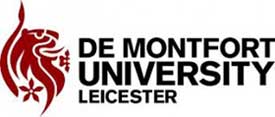About Digital Technology Innovation Bsc (hons) in De Montfort University
Digital Technology Innovation BSc (Hons) has a broad focus that mirrors the environment of enterprise resource management and planning, giving students a solid overview of system functionality, along with vocational experience.
The course is underpinned by SAP Enterprise Resource Planning (ERP) software which will enable you to confidently navigate and to learn how shared data supports business processes, for example in Operations, Financials and Corporate Services.
You will have access to our excellent facilities including dedicated computing laboratories, equipped with HP dual-boot and all-in-one computers and a high-performance file server. You will also have free access to the SAP Learning Hub where you can foster connections and expand your learning.
An optional placement year gives you the opportunity to gain valuable vocational experience and build your networks in the industry. For example, you may have the chance to work on SAP Student Lifecycle Management as part of a summer placement with DMU’s Information Technology and Media Services (ITMS) department.
We expect graduates of this course to find professional employment using and adapting ERP technology and management practices in roles including procurement, manufacturing, service, sales, finance and HR.
Key features:
- Understand the latest Enterprise Resource Planning (ERP) management practices by studying a range of SAP Business Process modules, including Business Process Basics and Navigation, Lifecycle Data Management , Human Capital Management and Integration of Business Processes.
- Develop your broader Computing skillset by studying modules such as Information Systems Development, Visual Web Development, Privacy and Data Protection and Computer Ethics.
- Prepare for a career in Digital Technology and Innovation, in roles such as Next-Gen Digital Innovators, SAP Administrators, Social ICT Entrepreneurs and Tech Founders.
- Take your practical skills to the next level in our specialist computing laboratories. You will have access to dedicated SAP content, including the SAP Next-Gen network which shares best practices and thought leadership across the global SAP Next-Gen network of educational institutions.
- Enhance your employability by enrolling directly with SAP UK for SAP Certification, as an independent add-on, as part of our partnership with SAP Next-Gen & SAP University Alliance.
- Learn from internationally-recognised academics. Computer Science and Informatics at DMU is ranked third among modern universities for the quality of its research in the latest Research Excellence Framework evaluation. z
Entry criteria
- Five GCSEs at grade C or above, including English Language or Literature and Mathematics or equivalent, plus one of the following:
- Normally 104 UCAS points from at least two A-levels or equivalent or
- BTEC National Diploma/ Extended Diploma at DMM or
- Pass in the QAA accredited Access to HE. English GCSE required as a separate qualification as equivalency is not accepted within the Access qualification. We will normally require students to have had a break from full-time education before undertaking the Access course or
De Montfort University Highlights
| Type of Institution |
Public |
| Campus Setting |
Urban |
| Endowment |
£1.17 million |
| Number of Campuses |
4 faculties |
| Number/Percentage of International Students |
23205 |
| Total number of Professors |
3240 |
| Student Satisfaction Rate |
86% |
| Graduate Job Rate |
97.3% |
| Number of Residence Vacancy |
Around 3000 |
| International fee |
Undergraduates- £13240 (annual) Postgraduates- £15950 (annual) |
| Number of Academic Programs |
UG, PG, Part time, distance, blended |
| Mode of Program |
Full time, distance and online |
| Average Graduate Salary |
19800 pounds a year |
De Montfort University The tuition fee (In GBP) for various programs is tabulated below:De Montfort University Average Cost
| Field of Study |
Avg.Fees |
| Art, Design and Humanities: |
£13,750 |
| Business and Law |
£13,750-£14,550 |
| Media |
£13,750 - £14,250 |
| Engineering |
£14,250 |
| Computing |
£14,250 |
| Health and Life Sciences |
£13,250 - £14,250 |
| Nursing BSc |
£14,950 |
De Montfort University The Average Tuition Fees and Other Expenses
| Expenses |
Estimated cost in pounds |
| Undergraduate tuition fee |
13,250- 14950 |
| Postgraduate tuition fee |
13600-15,900 |
| On campus accommodation |
5,000-6040 |
| Average cost of living |
97-110 per week |
DMU International Scholarship up to 1500 pounds
- TEF Gold Outstanding Alumni Scholarship up to 3000 pounds
- Leicester Castle Business School Scholarships:
- Global MBA Scholarship £3,000 - £5,000
- Full Postgraduate Scholarship
- LGBTQ + Allies Scholarship-two fully funded post graduate taught scholarship packages including full fee weaver and maintenance bursary.
- Vice Chancellor's Sports Scholarship- three different scholarship packages are available with eligible students being awarded up to 6000 pounds of support.
